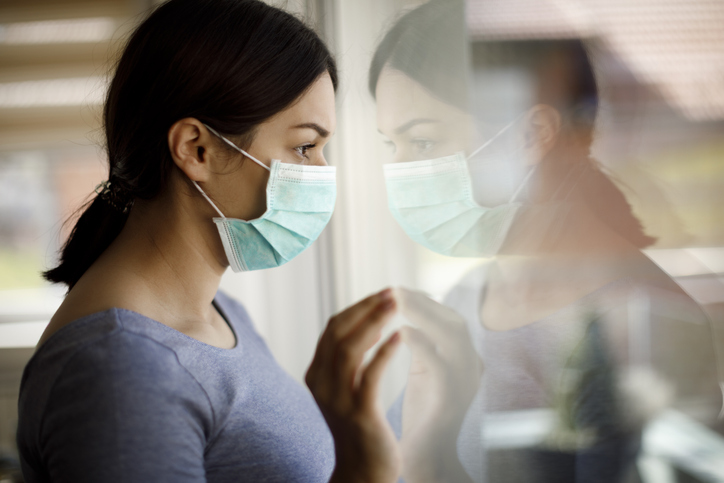COVID-19 May Make Addiction and Mental Illness Harder To Overcome, But We Can Still Be Proactive

By Joy Stephenson-Laws, JD, Founder
COVID-19 has really shed light on the fact that there is a major obesity epidemic in America. We are seeing cases of young people suffering from serious complications due to the virus, and in many instances it is because they are overweight.
But there is also a substance abuse epidemic in this country which this virus has also exposed.
Now it’s all this is complicated because because alcohol is legal and alcohol sales drastically went up when coronavirus related restrictions and regulations started to take hold on the U.S. These circumstances may have actually exacerbated some of the issues people with addiction and mental health problems face (especially those who live alone).
One might think that if bars and nightclubs are closed, people should be drinking less. Unfortunately, this is not the case. Reports show that many people are really struggling with being isolated and using drugs and alcohol to cope with this isolation and even boredom that can come with this new way of life we are all living. Not to mention, some people have lost their jobs and are just extremely stressed about the possibility of contracting COVID-19. You add all of this to someone who has struggled with depression and/or other mental health issues and substance abuse pre-coronavirus, and then you may really have a recipe for disaster.
"A person who struggles with depression may develop suicidal thoughts during isolation. Disordered substance users or addicts may possibly overdose. A person who has recently exited addiction rehab is at risk of relapse due to the stress surrounding the pandemic. Individuals who were social drinkers could become heavy drinkers in an attempt to cope with the boredom of lockdown," said George Comiskey, a professor at Texas Tech University who specializes in addiction and recovery, interviewed in this recent Medical Xpress report.

Recently, there have been some heartbreaking stories of this problem in the celebrity world. Benjamin Keough, who was the grandson of Elvis Presley and son of Lisa Marie Presley, recently died by suicide. He was just 27-years-old.
"Sometimes he struggled with depression, which is a serious thing with [the coronavirus pandemic] and everything happening right now and everybody being locked in the house," said Brandon Howard, one of Keough’s close friends, in an interview with People. "It takes a lot. I wish I could have been there."
Along with depression, several reports say that Keough also struggled with alcohol and drug abuse.
“It's a catch-22, he [Comiskey, who was mentioned earlier] explained. Drug use can increase the risks associated with COVID-19 infection, and at the same time, the social and psychological risks of the pandemic can intensify drug use,” according to the Medical Xpress report.
And even though it is clear that abusing your body with alcohol and drugs can increase your risk of having complications from COVID-19 by promoting inflammation and weakening the immune system, there are a lot of mixed messages that may give us the idea that drinking our way through the pandemic is not so bad. After all, how else are we supposed to cope with isolation, homeschooling our kids and having our normal social activities and travel plans and holidays ripped from us?
In many states, liquor stores and cannabis dispensaries are considered essential businesses, so this may send the message that liquor and cannabis are, well, essential.
It also doesn’t help that we are spending so much time at home and perhaps watching a lot of television. I’m sure you’ve seen more than your fair share of beer, wine and liquor commercials. Furthermore, social media feeds are filled with people and some of our favorite celebrities enjoying giant quarantine cocktails.
But treating depression and coronavirus stress with alcohol and drugs is like putting a band-aid over the problem - a very dangerous band-aid given that these substances may push some people over the edge or make them unable to successfully fight off COVID-19.
How can we be proactive?Obviously, the easy answer is to not drink alcohol or use drugs. But, of course, if it were that easy millions of Americans would not be currently struggling with alcohol and drug dependence. With that said, there are still proactive steps we can all take.
- Check on a friend. If you have a friend, family member or coworker who lives alone or you suspect that this person may struggle with mental health issues or substance abuse, give them a call and check on them. This small action can really go a long way. Take advantage of FaceTime and other methods that allow people to connect face to face.
- Join a virtual community. If you struggle with addiction, you may not be able to take full advantage of rehab facilities and in-person recovery groups. But you can still take advantage of online forums that help with this issue. Same goes for depression and mental health issues.
- Get therapy. Most therapists have adjusted to doing individual sessions through technology.
- Get outside, get some sun. Having a vitamin D deficiency may increase the risk of developing depression or make symptoms of depression worse. Getting enough vitamin D may also provide protective benefits against respiratory illness.
- Exercise. Replace that five o’clock glass of wine with a walk or some virtual yoga. It’s amazing what exercise can do for the body besides help you maintain a healthy weight. Research has shown that just an hour of exercise a week may help keep depression away.
- Eat healthily. The great thing about taking care of your health with good nutrition is that doing this helps tackle multiple issues. A nutrient-diet may boost your immune system and prevent inflammation, prevent depression and help you sleep better (just to name a few). All of these things matter when it comes to fighting addiction issues. It is also important to take routine nutrient tests in order to identify any nutrient imbalances or deficiencies you may have.
To learn more about the effects of alcohol abuse during COVID-19, check out this pH Labs blog.
Enjoy your healthy life!
Disclaimer: This article is not intended to provide medical advice. Please consult with your doctor or another competent healthcare practitioner to get specific medical advice for your situation.
The pH professional health care team includes recognized experts from a variety of health care and related disciplines, including physicians, attorneys, nutritionists, nurses and certified fitness instructors. This team also includes the members of the pH Medical Advisory Board, which constantly monitors all pH programs, products and services. To learn more about the pH Medical Advisory Board, click here.







